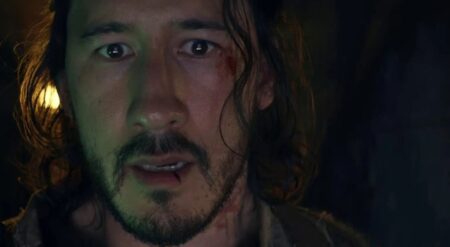
The days are getting short. The nights are cold. For a lot of us, it’s about to be another tough winter of depression and anxiety. Jonah Hill made Stutz for us. And for everybody else too. A documentary years in the making, Stutz is about Phil Stutz, Jonah’s therapist and a pioneer in creative visual therapy techniques. He initially set out to make the film to help share with the world the tools that have made his life better. But in the course of making the movie, it evolved into something so much more, something utterly moving and inspirational that any victim of the human condition would be remiss not to watch.
I am often critical of how therapy is depicted on-screen. Because I have spent so many hours enduring it myself, I am especially sensitive to the ways the profession is pilloried and the recipients of its help are diluted to caricatures. Stutz takes the topic of therapy directly to the source. Stutz is evidently an incredible doctor whose natural ability to understand people and connect with them is a tool even greater than any of his psychotherapy techniques. He’s developed over a long career a visualizing technique to explain an assortment of “tools” he uses and trains patients to understand that are meant to help them address their base-most fears and work towards overcoming them.
There are a lot of different kinds of therapy. And for a reason. Cognitive-behavioral approaches don’t work for everyone, just as dialectical approaches don’t either. While you may well feel an urge to take notes on Stutz’s every word, and they may be incredibly transformative on their own, it’s essential to understanding the power of this film, that the doctor’s power is less in the tools and more in his relationships. There is a genuine and abiding love between Stutz and Hill. Their relationship isn’t transactional by any means. They express their love for one another and have a report grounded in mutual understanding, humor, and a creative pact.
As characters in a film, these two are perfect. Hill isn’t acting; he’s just himself, which ranges from hilarious to introspective with a ton of vulnerability in between. But it’s really Stutz who is the heart of everything in the movie, as he should be. The movie was made to honor the affection Hill has for him and the relationship they enjoy, but in so many ways, the film makes for a moving opportunity for Stutz to look within himself and grow, even in his 70s. Their chemistry is film-worthy, and both humans have enduring charm.
The film is shot in black and white, which at first feels like an odd choice. The lighting is a bit strange at times, and it feels like a very standard documentary with Stutz and his work as the subject and Jonah as merely an interviewer. The film is interspersed with photos from Stutz’s past and creative visualizations of his tools based on the doctor’s own drawings. But about 30 minutes into the film, just as you’re checking how long it is and wondering how it could possibly have a full hour remaining, a switch is flipped, and the entire tone of the movie changes. To share how would be a disservice to the impact the moment of transition has unto itself. But it’s a change that takes the film even deeper as Jonah realizes that he, too, must be a subject and engage with the movie in his own right in order for it to reach its full potential depicting the life, skill, and impact of Phil Stutz.
If you’ve ever feared therapy, been unsure of its potential, or believed that the right therapist is out there for you, I can’t promise that Stutz will remedy that for you. I’ve gone through at least a dozen therapists who were bad for me before I finally found my most recent one, and I’m a white person with insurance. What I can promise is that Stutz will make you believe that therapy works, as you can see the life-changing impact it has had on Jonah Hill. And from there, perhaps it will give you the motivation to at least try your own therapeutic journey, even if it’s just heeding the various tools of Phil Stutz.
The style of therapy Phil Stutz offers is not for everyone. It may even be controversial in how deeply personal it is. But you cannot deny the effect it has on Jonah Hill or the impact it will have on viewers. Take its therapy tools with a grain of salt, but understand that this is precisely the kind of communication and relationship that deserves to be uplifted as transformative.
Stutz is streaming now on Netflix.
Stutz
-
Rating - 9/109/10
TL;DR
The style of therapy Phil Stutz offers is not for everyone. It may even be controversial in how deeply personal it is. But you cannot deny the effect it has on Jonah Hill or the effect it will have on viewers. Take its therapy tools with a grain of salt, but understand that this is precisely the kind of communication and relationship that deserves to be uplifted as transformative.






